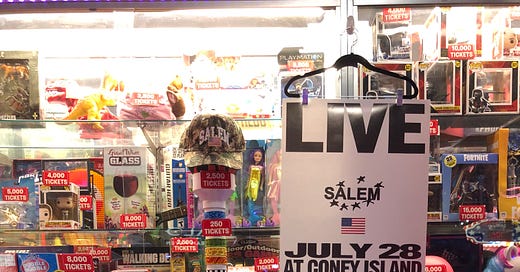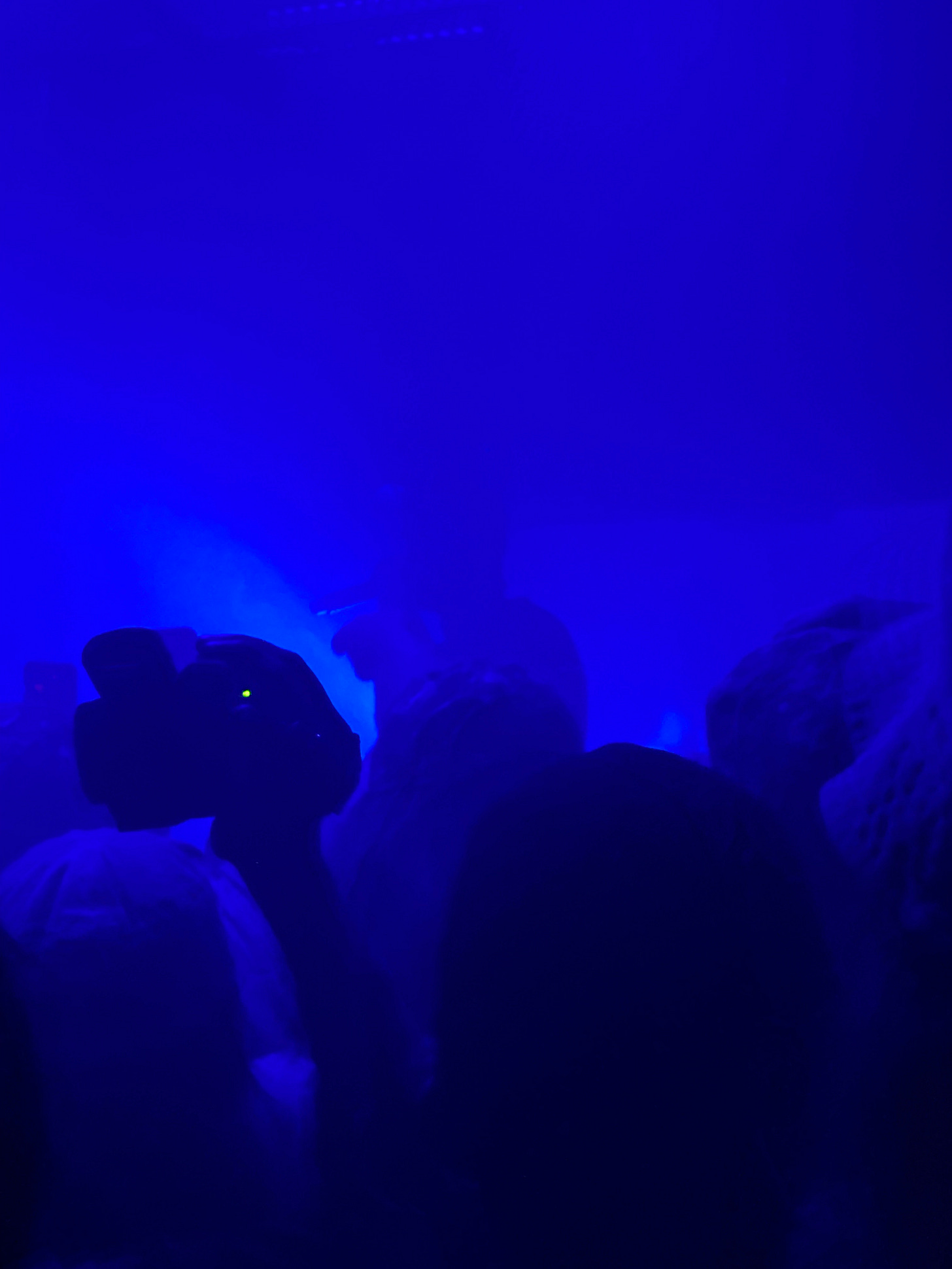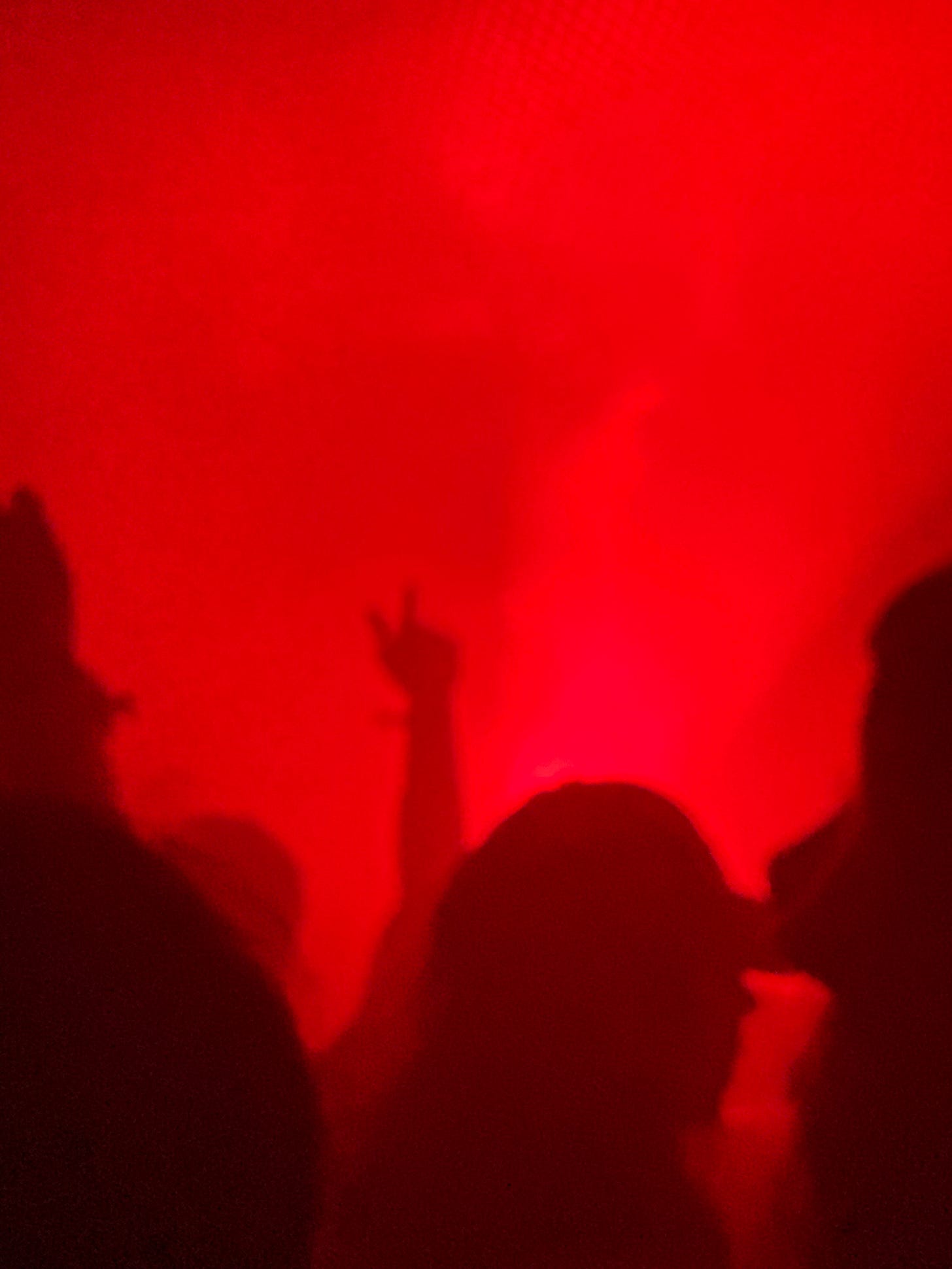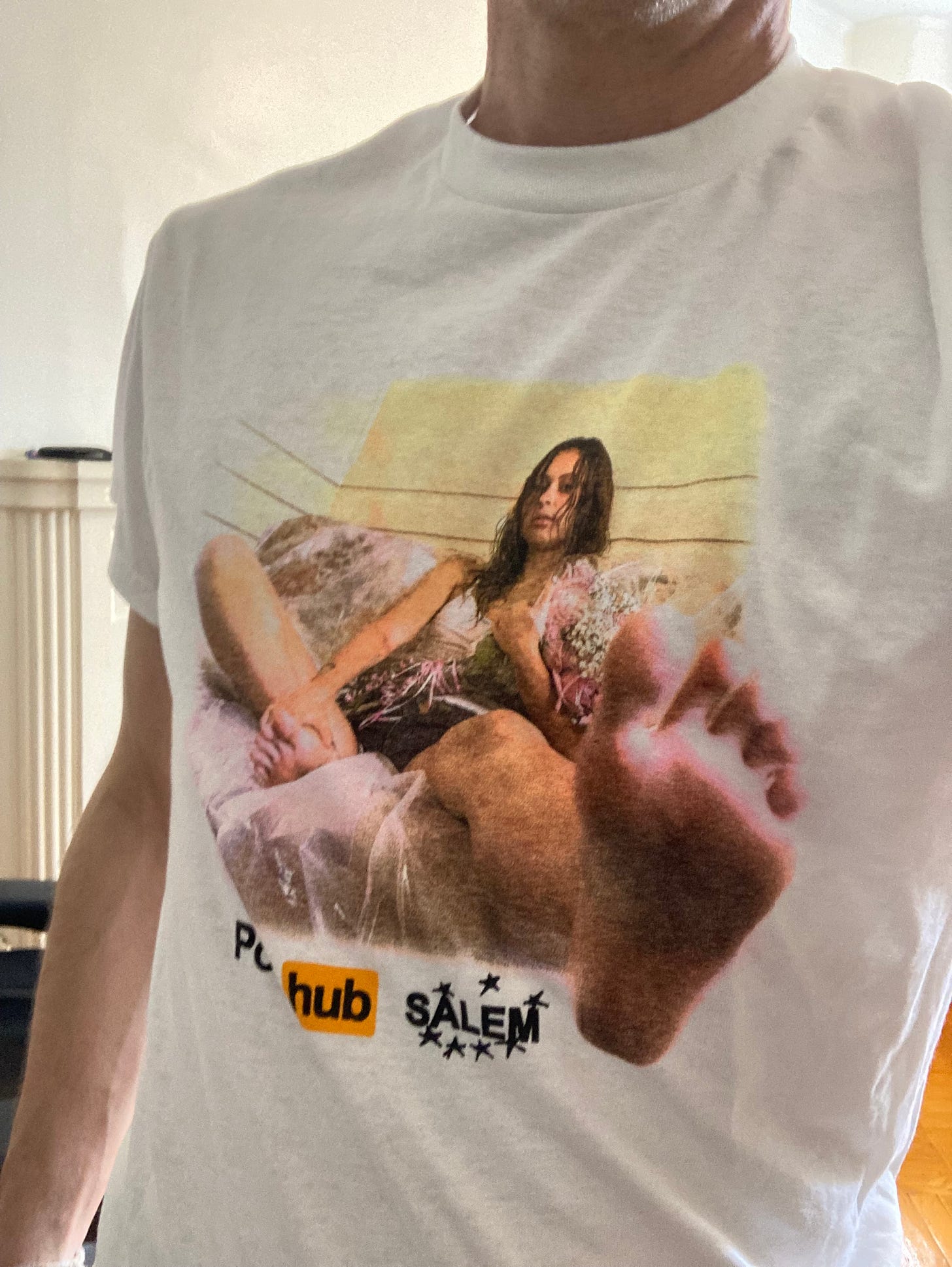1.
Last Friday night, I went to see Salem in a surprise show sponsored by PornHub. The night after that, I went to see Le Tigre in the final show of their US reunion tour. You could write a whole book about the juxtaposition. For now, I’ll start with Salem.
It was a stroke of luck that I made it to the Salem show at all. I only heard about it on Wednesday, when my friend Chris posted about having an extra ticket. Salem. Coney Island. Bumper cars. PornHub: the keywords could be the opening line of my first contribution to Heavy Traffic, wherein I appear to be careening down dark and winding roads at suicidal speeds high as a kite on oxy because, I dunno, permacrisis?, because my aestheticism is too rare for this cruel world? but in the end the lights go up and the music stops and I’m just bumping my ass off on Surf Avenue, high as a kite on oxy.
I snoozed and lost on the ticket, but Chris encouraged me to come out anyway. The improbable scenario—the porn giant underwriting a pop-up concert by a famously erratic band at Eldorado Auto Skooter, part of a beloved Coney Island arcade complex—had violated enough logic to suggest that anything could happen.
The plan: pretend to be on the guest list. It worked because the kids working the door were merciful, good humored, and most of all intoxicated. The cheerily gakked-up young woman handling VIPs kept saying For sure, for sure as she flicked her index finger up and down her phone; I got the impression that she was so high she was having trouble focusing her eyes. When she asked whose list I was on, I gave the promoter’s name, which I had crucially overheard in line for a Long Island Iced Tea at a nearby tiki bar. For sure, for sure. When I started spelling my name out loud, she suddenly declared Oh yeah, for sure, Domenick, for sure! as if she had been staring at it all along. She handed me a couple of bracelets, and I have rarely felt so successful in all my life.
Video by RAS
The gaming area served as the waiting room, the skee-ball alleys switched off and serving as makeshift chaises. Most of the other amusements were still on, the jumbo Space Invaders and a Fast and Furious game attracting virtual shooters and drivers. Miller Lites and tequila drinks were available for a proletarian five bucks each. The median age was twenty-five, but there were fewer overt selfie-chasers and wannabe influencers than I expected. People were wearing Salem gear—some of it freshly purchased at the up-and-running merch table—or else something uniform in the black tee/cargo pant//tank top/slim jeans lowkey-retro indie-sleaze vein. A few demi-goths livened up the place in fishnet tops and extravagant footwear.
The room had an undeniable hum. Everyone—including the handful of art people I saw there, you know who you are—was excited because we knew that, for once, there was no cooler place we could possibly be.
The show would take place inside the bumper velodrome itself, the cars parked off to the sides and below a series of disco balls along the center median. The only PornHub branding was a discreet freestanding dancer’s pole up front, mounted on a tiny circular platform. During the show, a woman used it for a song or two, the pole joggling enough off axis to make it look like she was vaulting rather than dancing.
As the crowd began to trickle in, a sparse, dirgelike soundtrack began lurching out of the monitors like a prelude in a church of questionable creed, and a fog machine began heaving up smoke, as it would throughout the set. The miasma poured into the audience so that the whole performance took place behind a heavy shroud, and the cheap, blocky flashing lights of the arena—red, white, green, blue—had maximal effect, tinting and subsuming the entire room.
Within this cloud, Salem, so elusive and adored, materialized onstage.
2.
There are some artists who are have many great ideas; we call them protean. That’s Rosemarie Trockel. And then there are some artists who have only one very good idea. That’s Salem.
Since they appeared in the late ’00s, Salem’s genius has laid in combining trap beats with goth gloom and plunging the results into a bath of narcotics, dark and glittering. In a way, they were coal-mine canaries of the opioid crisis, warbling their dark tunes before the country had admitted to itself the scope of what was going on, the facts of the Sacklers as opaque as the band’s vocals. Their music had the grim allure of snorting crushed-up pills in a Rust Belt basement. And yet little touches showed a sense of humor—the remixes of Gucci Mane, the sampling of “Clair de lune,” the way the bathos of their “Forever Young” remix stretched the lugubrious song into something ridiculous—but also something awful.
From their first inimitably titled official release, Yes I Smoke Crack (2008), everything they touched was gold. They birthed a whole genre, witch house, and you can more or less thank them for every melon collie boi rapper that’s emerged in the years since. They were art adjacent and fashion endorsed, performing at Miami Basel and scoring shows for among others Givenchy.
And then, punctually, they disappeared. The reasons were more or less as you might imagine, detailed in this excellent piece by Meaghan Garvey. For a brilliant interview from the band’s first go-round, see Michael Bullock’s 2008 conversation with the group’s John Holland in the recently relaunched Butt magazine.
With little warning and to great surprise, Salem released a new album in 2020, titled Fires in Heaven, minus founding member Heather Marlatt. To even greater surprise, it sounded as if it had been recorded the month after we last heard from them, and was just about as good. The single, “Starfall,” is in fact the most gorgeous piece of music they’ve ever produced, a song about addiction reinforced by an extraordinary video where the two remaining band members turn stormchaser, tailing tornados across Oklahoma. It was both a metaphor for recovery and a document of it; a declaration of survival, of coping, with the jolts of drugs and flirting with one’s own erasure displaced in pure and sublime—if perhaps not unqualifiedly healthy—form.
3.
Back in Eldorado—that endlessly receding golden kingdom—the beats began and a slow, familiar melody tipped its hand; was it “Redlights”? The crowd went nuts. Then Jack Donoghue got on the mic, and I remembered all of sudden that Salem’s brilliance is inseparable from their terribleness.
On the dry-erase board of memory, the Salem fan like myself scuffs off the fact that their vocals are frequently affected rapping. Barlatt’s ethereal melodies are gone. Holland’s vocals are different, he mumbles or wails, and at Eldorado they were mixed so low that they were whispers in the fog. That leaves Donoghue, who tends to get a little Three 6 Mafia.
In 2023, rap is a broadly American—broadly international—musical idiom; it goes without saying that there’s nothing wrong with a white guy doing it. Salem’s trap beats always seemed clever and apropos, no matter how they came by them; if their screw technique was a little derivative, it was more or less as authentically arrived at as DJ Screw’s. But the vocals, even landslid under distortion, always have felt a little wrong when the stylings skew gangsta. Live, I cringed at Donoghue’s Dirty South inflections. Rest assured that he was not recently interviewed by Jon Caramanica in celebration of hip-hop’s golden anniversary.
While race has always quietly bedeviled Salem, as America’s racist history bedevils everything in the United States, what seeing the band live illuminated for me was more related to class. If lumpenprole feels a little too nasty to use these days, and tidy notions of economic determinants are too complicated by the crosstabs, we could say Salem belongs to the deaths-of-despair class.
The deaths-of-despair class is mostly white, as we so often hear, but is subsumed in the real hybridities of American small towns and strip-mall exurbia. Thus at the Salem merch table, camo baseball caps with the band’s name blazoned in proud white block letters coexist sans paradox alongside hoodies that detourne Jeezy’s iconic angry snowman of the ’00s with SALEM as its frowning grill. The band may have scored runway shows and can pull a chic crowd on a Friday night in NYC, but Jack Donoghue is still a guy Lana del Rey wanted to date, which should tell you everything you need to know.
As the lyrics to “Starfall” say (in reference to the intractability of drug problems), “I don’t have no answers for you.” I can only testify that, at Eldorado, the profusion of tallish white men with beards in scrubby tees and cargo shorts was giving fish-and-game club. Switch SALEM out for ALABAMA on those hats and you could be at any bar in the South on a Saturday afternoon in the fall; switch in MICHIGAN and throw on a fleece and you could be on Salem’s home turf. There was an alternate universe where we were not in a lunapark in Coney Island but at the Gathering of the Juggalos in rural Ohio. Which, to be clear, I would one day like to attend.
The crowd’s biggest response—and the most emblematic moment of the evening—came when a few unsettled chords yielded to the three-note descending melancholy of “Starfall.” By the beginning of the second verse, a woman standing next to me whispered to her boyfriend precisely what I was thinking: “I don’t remember it being this slow.”
I waited in line for twenty minutes after the show with the goal of buying a particular T-shirt: SALEM bedazzled in red white and blue, curved to resemble a gently waving American flag. Like the rest of the goods on offer, it resembled nothing so much as a selection from the racks at Wal-Mart, a store I patronize every time I visit my family in South Carolina. The aesthetic nod carries over through Salem’s song “Crisis,” which seems to be about ODing in a Wal-Mart parking lot. Its protagonist may well have been there to pick up the prescription mentioned in the lyrics: a few months after Fires in Heaven came out, Wal-Mart was sued by the Justice Department for its wanton distribution of painkillers over the years. In 2022, the company settled the various lawsuits against it for $3.1 billion.
By the time I got to the head of the line, the stars-and-stripes SALEM was sold out in my size. I had to settle for the PornHub-branded shirt, which features an incredibly poorly printed image of Stella Barey, currently PornHub’s #546-ranked starlet, thrusting her foot into the foreground. It was disappointing; I’m not really a foot guy. But it was the single unique event-only clothing item, and as a wily art dealer on the premises consoled me, I could just flip it online. Don’t expect to see me wearing my Salem swag around, thus; I need to keep the shirt cherry for my retirement.
Mea Culpa
I would only ever want to lambast someone for something they actually have done. Thus Spigot offers the following correction:
The issue “So You Wouldn’t Have To” of June 26, 2023, featured an item titled “Annals of Coincidence.” It turns out that the painting by Alex Carver featured in Ugly Painting was not in fact available for purchase. Thus my use of the word sell was in error. The mistake feels a bit like forgetting to read a perp their Miranda rights on Law and Order, but nevertheless, I was wrong, and I regret the screw-up. Spigot apologizes for foolishly assuming that an artwork displayed in a commercial showroom full of other works for sale would itself be for sale.






